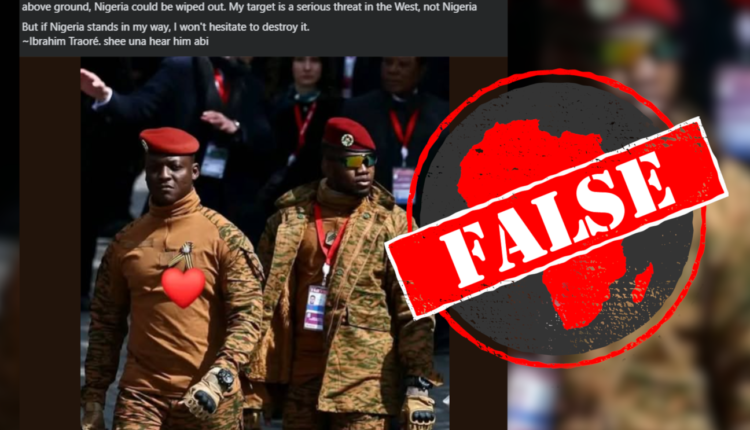Viral social media claims that Burkina Faso’s leader, Ibrahim Traoré, vowed to destroy Nigeria are baseless and not supported by any credible evidence.
A series of viral Facebook posts allege that Burkina Faso’s military leader, Captain Ibrahim Traoré, threatened to wipe out Nigeria using his country’s air force. The quote, which suggests Traoré said he would “destroy Nigeria” if it stood in his way, has circulated widely — but checks show the statement is entirely fabricated.
Traoré, 36, assumed power in September 2022 after leading a coup that removed interim leader Paul-Henri Damiba. Since then, he has promoted pan-African reforms, strengthened military operations against terrorism, and cut ties with France, Burkina Faso’s former colonial ruler.
In 2023, Traoré joined forces with Mali and Niger to form the Alliance of Sahel States. The bloc withdrew from the Economic Community of West African States (ECOWAS) in early 2024 — a move that drew attention but did not indicate any hostility toward Nigeria, a leading ECOWAS member.
Despite their divergent political paths, Burkina Faso and Nigeria have maintained regional cooperation, especially in matters of security. There is no current diplomatic crisis between the two countries that would explain such an extreme threat.
Yet, one of the false posts claims Traoré said:
“I am not afraid of Nigeria – not even for a second. With a single strike from my air force at 34,000 feet above ground, Nigeria could be wiped out… If Nigeria stands in my way, I won’t hesitate to destroy it.”
Fact-checks found no record of Traoré ever making such a statement. Searches through official communications, press conferences, and government releases yielded nothing. Additionally, no reputable local or international news outlet has reported the claim.
Analysts say if such a provocative threat had been made, it would have triggered serious diplomatic fallout and widespread media coverage — none of which has occurred.
The spread of this false quote highlights the growing risk of disinformation on social media, especially when it comes to sensitive regional politics.



[…] northern Canada into states like Minnesota, Wisconsin, Iowa, and Illinois, with air quality levels ranging from “moderate” to “unhealthy”, according to the Environmental Protection Agency’s AirNow […]